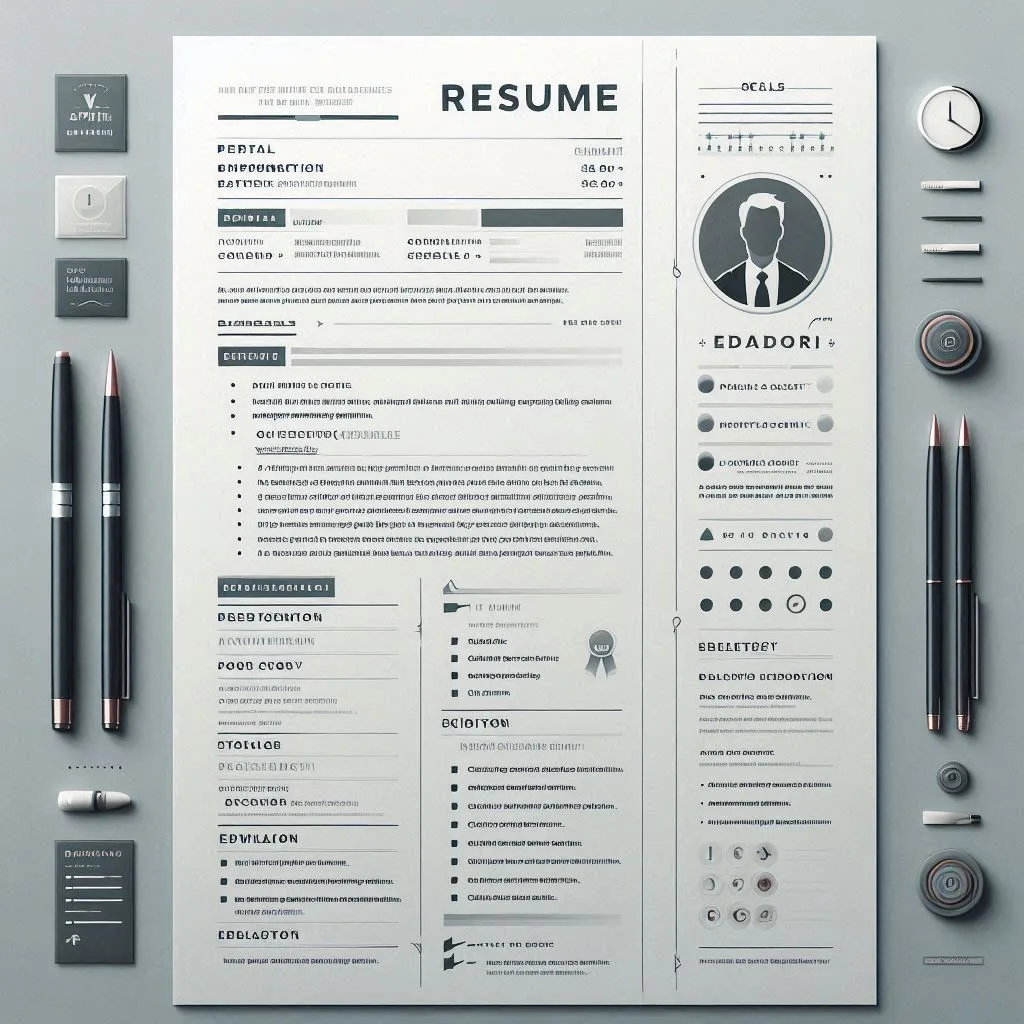Introduction
In the realm of internal audit, bookkeeping roles play a crucial part in ensuring financial accuracy and compliance within organizations. These positions are not only foundational to the financial health of a company but also serve as a stepping stone for individuals aspiring to build a career in finance and auditing. However, for many job seekers, particularly those entering the workforce or transitioning careers, the challenge of securing a bookkeeping job without prior experience can feel daunting.
Many candidates find themselves grappling with the perception that a lack of experience disqualifies them from consideration. This misconception can be particularly discouraging, as employers often seek candidates who demonstrate enthusiasm, a strong work ethic, and a willingness to learn—qualities that can be showcased effectively through a well-crafted resume. The key lies in presenting one’s skills, education, and any relevant experiences in a manner that highlights potential rather than focusing solely on past employment history.
This blog post aims to empower job seekers by providing practical tips for crafting an impactful resume tailored for no experience bookkeeping jobs in internal audit. By focusing on transferable skills, relevant coursework, and personal achievements, candidates can position themselves as valuable assets to potential employers, even in the absence of traditional work experience. Whether you are a recent graduate, a career changer, or someone re-entering the workforce, these strategies will help you navigate the job market with confidence and clarity.
Understanding Bookkeeping
Bookkeeping is a fundamental aspect of financial management that involves the systematic recording, organizing, and tracking of financial transactions. It plays a crucial role in maintaining financial accuracy, which is essential for any organization. Here are some key points to consider regarding bookkeeping’s relevance within the field of internal audit:
- Definition and Role of Bookkeeping: Bookkeeping is the process of recording daily transactions, managing accounts payable and receivable, and ensuring that financial records are accurate and up-to-date. This foundational work is vital for producing reliable financial statements and reports, which are essential for decision-making and compliance with regulations.
- Essential Skills for Internal Audit: The skills acquired through bookkeeping are directly applicable to internal audit processes. Internal auditors rely on accurate financial data to assess the effectiveness of an organization’s internal controls, risk management, and governance processes. Proficiency in bookkeeping equips individuals with the ability to analyze financial records, identify discrepancies, and ensure compliance with accounting standards. Skills such as attention to detail, analytical thinking, and familiarity with financial software are particularly valuable in this context [3].
- Demand for Entry-Level Bookkeeping Positions: There is a consistent demand for entry-level bookkeeping positions in the job market, particularly as organizations seek to maintain accurate financial records and comply with regulatory requirements. Many companies are willing to hire candidates without extensive experience, provided they demonstrate a solid understanding of bookkeeping principles and a willingness to learn. This creates opportunities for job seekers to enter the field of internal audit through bookkeeping roles, allowing them to build relevant experience and skills that can lead to advancement within the profession.
Understanding the role of bookkeeping in internal audit is essential for job seekers looking to craft an impactful resume for no experience bookkeeping jobs. By highlighting relevant skills and demonstrating a commitment to learning, candidates can position themselves favorably in a competitive job market.
Identifying Transferable Skills
When applying for bookkeeping jobs, it’s essential to recognize and effectively showcase your transferable skills, even if you lack direct experience in the field. Here are some key points to help you identify and present these skills in your resume:
Common Transferable Skills
- Attention to Detail: Bookkeeping requires meticulous attention to detail to ensure accuracy in financial records. This skill is crucial for tasks such as reconciling accounts and preparing financial statements.
- Analytical Thinking: The ability to analyze data and identify trends is vital in bookkeeping. This skill helps in understanding financial reports and making informed decisions based on the data.
- Organization: Strong organizational skills are necessary for managing multiple accounts, tracking expenses, and maintaining orderly financial records. An organized approach can prevent errors and streamline processes.
- Communication Skills: Effective communication is important for discussing financial matters with clients or team members. Being able to explain complex financial information in a clear manner is a valuable asset.
- Problem-Solving: Bookkeepers often encounter discrepancies or issues that require quick thinking and problem-solving abilities. This skill is essential for resolving financial discrepancies and ensuring accurate reporting.
Reflecting on Past Experiences
Encourage readers to reflect on their past experiences, such as internships, volunteer work, or even academic projects, where they demonstrated these transferable skills. Here are some prompts to guide their reflection:
- Internships: Did you handle any financial tasks, even if they were minor? Highlight any experience with budgeting, expense tracking, or financial reporting.
- Volunteer Work: Have you volunteered for organizations where you managed funds or kept records? This experience can be relevant and should be included in your resume.
- Academic Projects: Consider any group projects that required financial analysis or budgeting. Discuss your role and how it contributed to the project’s success.
Examples of Relevance in Bookkeeping
To help job seekers understand how their skills apply to bookkeeping, provide specific examples:
- Attention to Detail: If you have experience in data entry or proofreading, emphasize how these tasks required a keen eye for detail, which is directly applicable to maintaining accurate financial records.
- Analytical Thinking: If you’ve worked on projects that involved analyzing data or creating reports, explain how these experiences have prepared you to analyze financial statements and identify discrepancies.
- Organization: If you have managed schedules or coordinated events, illustrate how these organizational skills can translate into managing financial records and ensuring timely reporting.
By identifying and articulating these transferable skills, job seekers can craft a compelling resume that highlights their potential for bookkeeping roles, even without prior experience. This approach not only enhances their candidacy but also demonstrates their readiness to contribute effectively in a bookkeeping capacity.
Crafting the Perfect Resume
Creating a resume for bookkeeping positions, especially when you lack direct experience, can be a daunting task. However, with the right approach, you can effectively showcase your potential and stand out to employers. Here are some essential tips to help you craft an impactful resume that highlights your strengths and qualifications.
1. Importance of a Clean and Professional Format
A well-structured resume is crucial, particularly for bookkeeping roles where attention to detail is paramount. Here are some formatting tips to consider:
- Choose the Right Format: Opt for a functional resume format that emphasizes your skills and abilities rather than a chronological work history. This format allows you to highlight your competencies, making it ideal for those without extensive experience [1].
- Maintain Clarity and Readability: Use clear headings, bullet points, and a consistent font style to ensure your resume is easy to read. A clutter-free layout reflects professionalism and organization, traits that are highly valued in bookkeeping [5][6].
2. Crafting a Strong Summary Statement
Your summary statement is your opportunity to make a memorable first impression. It should be concise yet impactful, tailored specifically to the bookkeeping field. Consider the following:
- Highlight Relevant Skills: Focus on your analytical abilities, attention to detail, and any relevant soft skills that align with bookkeeping tasks. This statement should convey your enthusiasm for the role and your readiness to learn [7][9].
- Showcase Your Potential: Even without direct experience, you can emphasize your willingness to grow and adapt. Mention any personal projects or volunteer work that demonstrate your commitment to the field [2][3].
3. Include Relevant Coursework and Certifications
When lacking formal work experience, your educational background becomes a vital component of your resume. Here’s how to effectively incorporate this information:
- List Relevant Coursework: Detail any classes or projects related to accounting or finance that you have completed. This can include subjects like financial accounting, managerial accounting, or bookkeeping principles [12][8].
- Certifications and Online Courses: If you have completed any certifications or online courses in bookkeeping or accounting, be sure to include them. These credentials can help validate your knowledge and skills, making you a more attractive candidate [9][10].
By following these guidelines, you can create a resume that not only highlights your potential but also positions you as a strong candidate for bookkeeping jobs, even without prior experience. Remember, your resume is a reflection of your capabilities and enthusiasm, so take the time to craft it thoughtfully.
Highlighting Soft Skills and Personal Attributes
When applying for no experience bookkeeping jobs, particularly in the field of Internal Audit, showcasing your soft skills and personal attributes can significantly enhance your resume. While formal experience may be lacking, emphasizing these qualities can demonstrate your potential and readiness for the role. Here are some key points to consider:
Identify Valued Soft Skills in Bookkeeping Roles
- Communication: Effective communication is crucial in bookkeeping, as it involves conveying financial information clearly to colleagues and clients. Highlight your ability to articulate ideas and collaborate with others.
- Reliability: Employers seek individuals who can be trusted to manage financial records accurately and meet deadlines. Emphasize your dependability and commitment to completing tasks on time.
- Adaptability: The ability to adjust to new situations and learn quickly is essential in a fast-paced environment. Showcase your willingness to embrace change and tackle new challenges.
- Attention to Detail: Bookkeeping requires meticulous attention to detail to ensure accuracy in financial reporting. Illustrate your capability to focus on the finer points and maintain high standards in your work.
- Problem-Solving: Highlight your analytical skills and ability to approach challenges with a solution-oriented mindset. This is particularly important in Internal Audit, where identifying discrepancies is key.
Presenting Soft Skills in Your Resume and Cover Letter
- Skills Section: Create a dedicated section in your resume to list your soft skills. Use bullet points for clarity and ensure that the most relevant skills are prominently featured. For example, you might include “Strong communication skills” or “Proven reliability in meeting deadlines” to catch the employer’s attention [2][11].
- Tailored Cover Letter: In your cover letter, weave your soft skills into your narrative. Instead of simply stating that you possess these skills, provide context. For instance, you could mention a group project where your communication skills helped resolve conflicts or how your adaptability allowed you to thrive in a new environment [3][12].
Demonstrating Personal Attributes Through Storytelling
- Use Specific Examples: When crafting your resume, consider incorporating brief anecdotes that illustrate your personal attributes. For instance, you might describe a situation where your attention to detail prevented a mistake in a school project or how your problem-solving skills helped a team overcome a challenge [9].
- Quantify Achievements: Whenever possible, use numbers to quantify your achievements. For example, if you managed a budget for a student organization, mention the amount and how you successfully kept expenses under control. This not only showcases your skills but also provides tangible evidence of your capabilities [3][8].
- Reflect on Experiences: Think about volunteer work, internships, or even personal projects that required you to utilize your soft skills. Highlight these experiences in your resume to demonstrate how you have applied these attributes in real-world situations [4][6].
By focusing on these strategies, job seekers can effectively highlight their soft skills and personal attributes, making a compelling case for their potential in no experience bookkeeping jobs within Internal Audit. This approach not only enhances the resume but also positions candidates as valuable assets to potential employers.
Leveraging Volunteer and Internship Experiences
When entering the job market, particularly in fields like bookkeeping and internal audit, many job seekers find themselves facing the challenge of having little to no formal work experience. However, this does not mean that you lack relevant skills or experiences. In fact, volunteer work and internships can serve as valuable assets in your resume, showcasing your potential to employers. Here are some key points to consider when leveraging these informal experiences:
- Recognizing Relevant Experience: Volunteer roles and internships often involve tasks that are directly related to financial management, such as budgeting, bookkeeping, or managing funds for a non-profit organization. Even if these experiences were unpaid, they can demonstrate your ability to handle financial responsibilities and your understanding of basic accounting principles. Highlighting these experiences can help bridge the gap in your resume and show employers that you possess the necessary skills for bookkeeping roles [2][5].
- Articulating Your Experiences: When detailing your volunteer work or internships on your resume, it’s essential to articulate your contributions effectively. Use action verbs to describe your responsibilities and achievements. For example, instead of simply stating “helped with bookkeeping,” you might say “managed financial records for a community event, ensuring accurate tracking of expenses and income.” This not only clarifies your role but also emphasizes your proactive involvement in financial management tasks [9][10].
- Highlighting Financial Management Tasks: Even informal tasks related to financial management can be significant. If you assisted in preparing budgets, tracked expenses, or contributed to financial reporting in any capacity, make sure to include these details. Employers appreciate candidates who can demonstrate a foundational understanding of financial processes, regardless of the setting in which they were learned. This can set you apart from other candidates who may not have any relevant experience at all [4][14].
- Showcasing Transferable Skills: In addition to specific financial tasks, consider the transferable skills you developed through your volunteer work or internships. Skills such as attention to detail, organizational abilities, and teamwork are highly valued in bookkeeping roles. Be sure to mention these skills in your resume summary or objective statement, as they can enhance your appeal to potential employers [1][3][13].
By effectively leveraging your volunteer and internship experiences, you can craft a compelling resume that highlights your potential as a candidate for bookkeeping jobs, even without formal work experience. This approach not only showcases your relevant skills but also demonstrates your commitment to the field and your willingness to learn and grow.
Using Keywords and Tailoring Applications
When applying for bookkeeping jobs, especially in the field of internal audit, it’s crucial to understand the role of keywords in your resume. Many companies utilize Applicant Tracking Systems (ATS) to streamline their hiring processes. These systems scan resumes for specific keywords that match the job description, helping employers identify qualified candidates quickly. Here’s how you can effectively use keywords and tailor your applications to enhance your chances of landing a job, even without prior experience.
Understanding Applicant Tracking Systems (ATS)
- Functionality: ATS software is designed to filter resumes based on keywords and phrases that are relevant to the job. If your resume lacks these keywords, it may not even reach a human recruiter.
- Importance of Relevance: The ATS looks for specific skills, qualifications, and experiences that align with the job description. Therefore, understanding the job requirements and incorporating relevant terms is essential for passing the initial screening.
Relevant Keywords for Bookkeeping and Internal Audit
To make your resume stand out, consider including the following keywords that are commonly associated with bookkeeping and internal audit roles:
- Bookkeeping Terms: Accounts Payable, Accounts Receivable, General Ledger, Reconciliation, Financial Statements, Payroll Processing, Budgeting, and Forecasting.
- Internal Audit Terms: Internal Controls, Risk Assessment, Compliance, Audit Procedures, Financial Reporting, Analytical Skills, and Process Improvement.
- Soft Skills: Attention to Detail, Time Management, Communication Skills, Problem-Solving, and Team Collaboration.
Incorporating these keywords into your resume can help demonstrate your understanding of the field and your readiness to take on the responsibilities of the role.
Tailoring Each Application
- Match Job Descriptions: Carefully review the job posting and identify the key skills and qualifications that the employer is seeking. Tailor your resume to reflect these requirements by using similar language and phrases.
- Highlight Transferable Skills: Even if you lack direct experience, you can emphasize transferable skills gained from education, internships, or volunteer work. For instance, if you have experience managing budgets in a school project, mention it under a relevant section of your resume.
- Customize Your Summary: Your resume summary should be a concise pitch that highlights your enthusiasm for the position and your relevant skills. Tailor this section for each application to align with the specific job you are applying for.
By understanding how ATS works and strategically using relevant keywords, you can significantly improve your chances of getting noticed by potential employers. Tailoring your applications to match job descriptions not only showcases your potential but also demonstrates your commitment to the role, making you a more attractive candidate in the competitive job market of bookkeeping and internal audit.
Networking and Seeking References
When it comes to landing bookkeeping jobs, especially for those without prior experience, networking and references can play a pivotal role in your job search. Here are some key points to consider:
- The Role of Networking: Networking is essential in the bookkeeping field as it can open doors to job opportunities that may not be advertised publicly. Engaging with professionals in the industry can provide insights into job openings, company cultures, and the skills that employers value. Attend industry events, join professional organizations, and participate in online forums to connect with others in the field. Building relationships with experienced bookkeepers can also lead to mentorship opportunities, which can be invaluable for someone just starting out.
- Reaching Out for References: When applying for bookkeeping positions, having strong references can significantly enhance your application. Consider reaching out to former employers, professors, or mentors who can vouch for your skills and work ethic. Even if you haven’t held a formal bookkeeping position, individuals who can speak to your character, reliability, and transferable skills can make a positive impact on potential employers.
- How to Ask for References Effectively: When requesting references, it’s important to approach the conversation thoughtfully. Here are some tips:
- Be Direct and Polite: Clearly explain why you are asking for a reference and how it relates to your job search in bookkeeping. A polite request shows respect for their time and effort.
- Provide Context: Share details about the job you are applying for and the skills or experiences you would like them to highlight. This helps your reference tailor their recommendation to the specific role.
- Offer to Reciprocate: If appropriate, let them know you are willing to return the favor in the future. This can strengthen your professional relationship and encourage them to support you.
- Follow Up with Gratitude: After they agree to provide a reference, express your appreciation. A thank-you note or email can go a long way in maintaining a positive relationship.
By leveraging networking opportunities and securing strong references, job seekers can effectively showcase their potential and stand out in the competitive field of bookkeeping, even without prior experience.
Conclusion
In conclusion, entering the field of bookkeeping, particularly in internal audit roles, is entirely feasible even without prior experience. It’s essential to understand that many employers value enthusiasm, a strong work ethic, and a willingness to learn just as much as they do formal experience. Here are the key takeaways to keep in mind:
- No Experience, No Problem: The absence of direct experience should not deter you from applying for bookkeeping jobs. Many candidates successfully secure positions by effectively showcasing their skills, education, and any relevant experiences, such as coursework or volunteer work [2][5].
- Proactive Resume Crafting: Take the initiative to craft a standout resume that highlights your transferable skills, relevant coursework, and any accomplishments from school or personal projects. Focus on your abilities and competencies rather than a chronological work history, as this can significantly enhance your appeal to potential employers [1][6][7].
- Engagement and Community: We encourage you to share your experiences and tips in the comments section below. Engaging with others can provide valuable insights and foster a supportive community for job seekers navigating similar challenges.
By following these strategies, you can position yourself as a strong candidate in the competitive job market for bookkeeping roles. Remember, every expert was once a beginner, and your journey starts with a well-crafted resume that reflects your potential.
Find out more about Shaun Stoltz https://www.shaunstoltz.com/about/
This post was written by an AI and reviewed/edited by a human.



